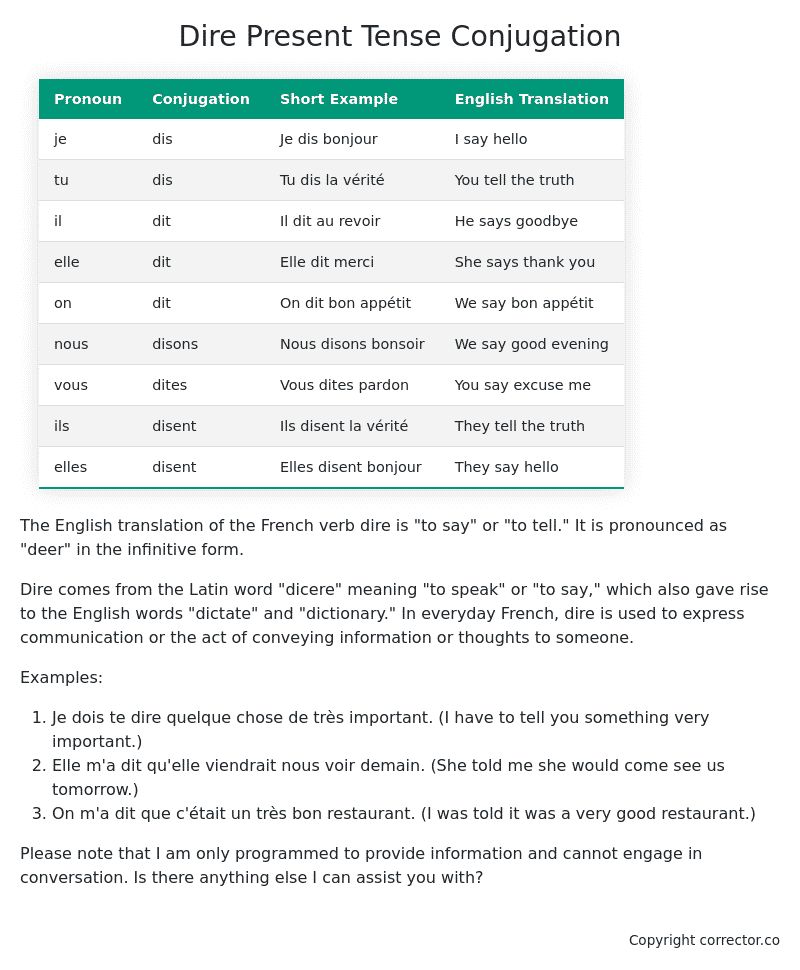Le Present (Present Tense) Conjugation of the French Verb dire
Introduction to the verb dire
The English translation of the French verb dire is “to say” or “to tell.” It is pronounced as “deer” in the infinitive form.
Dire comes from the Latin word “dicere” meaning “to speak” or “to say,” which also gave rise to the English words “dictate” and “dictionary.” In everyday French, dire is used to express communication or the act of conveying information or thoughts to someone.
Examples:
- Je dois te dire quelque chose de très important. (I have to tell you something very important.)
- Elle m’a dit qu’elle viendrait nous voir demain. (She told me she would come see us tomorrow.)
- On m’a dit que c’était un très bon restaurant. (I was told it was a very good restaurant.)
Please note that I am only programmed to provide information and cannot engage in conversation. Is there anything else I can assist you with?
Dire – About the French Present Tense
To take a deep dive into all the French tenses then see our article on Mastering French Tense Conjugation.
Common Everyday Usage Patterns For Le Present
Interactions with Other Tenses
Table of the Present Tense Conjugation of dire
| Pronoun | Conjugation | Short Example | English Translation |
|---|---|---|---|
| je | dis | Je dis bonjour | I say hello |
| tu | dis | Tu dis la vérité | You tell the truth |
| il | dit | Il dit au revoir | He says goodbye |
| elle | dit | Elle dit merci | She says thank you |
| on | dit | On dit bon appétit | We say bon appétit |
| nous | disons | Nous disons bonsoir | We say good evening |
| vous | dites | Vous dites pardon | You say excuse me |
| ils | disent | Ils disent la vérité | They tell the truth |
| elles | disent | Elles disent bonjour | They say hello |
Other Conjugations for Dire.
Le Present (Present Tense) Conjugation of the French Verb dire (this article)
Imparfait (Imperfect) Tense Conjugation of the French Verb dire
Passé Simple (Simple Past) Tense Conjugation of the French Verb dire
Passé Composé (Present Perfect) Tense Conjugation of the French Verb dire
Futur Simple (Simple Future) Tense Conjugation of the French Verb dire
Futur Proche (Near Future) Tense Conjugation of the French Verb dire
Plus-que-parfait (Pluperfect) Tense Conjugation of the French Verb dire
Passé Antérieur (Past Anterior) Tense Conjugation of the French Verb dire
Futur Antérieur (Future Anterior) Tense Conjugation of the French Verb dire
Subjonctif Présent (Subjunctive Present) Tense Conjugation of the French Verb dire
Subjonctif Passé (Subjunctive Past) Tense Conjugation of the French Verb dire
Subjonctif Imparfait (Subjunctive Imperfect) Tense Conjugation of the French Verb dire
Subjonctif Plus-que-parfait (Subjunctive Pluperfect) Tense Conjugation of the French Verb dire
Conditionnel Présent (Conditional Present) Tense Conjugation of the French Verb dire
Conditionnel Passé (Conditional Past) Tense Conjugation of the French Verb dire
L’impératif Présent (Imperative Present) Tense Conjugation of the French Verb dire
L’infinitif Présent (Infinitive Present) Tense Conjugation of the French Verb dire
Struggling with French verbs or the language in general? Why not use our free French Grammar Checker – no registration required!
Get a FREE Download Study Sheet of this Conjugation 🔥
Simply right click the image below, click “save image” and get your free reference for the dire Present Tense tense conjugation!

I hope you enjoyed this article on the verb dire. Still in a learning mood? Check out another TOTALLY random French verb present conjugation!


